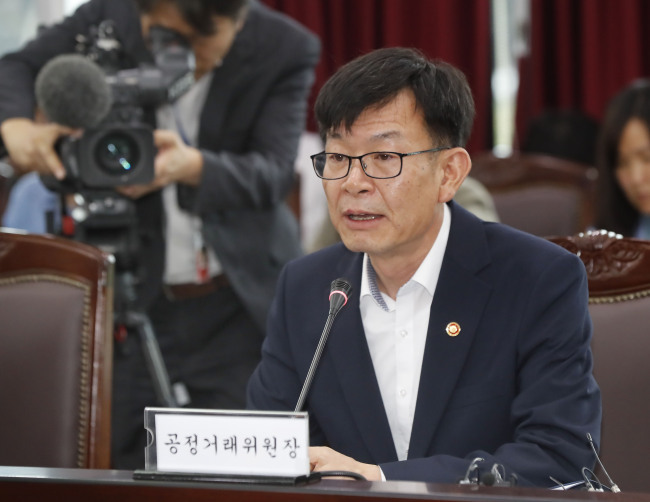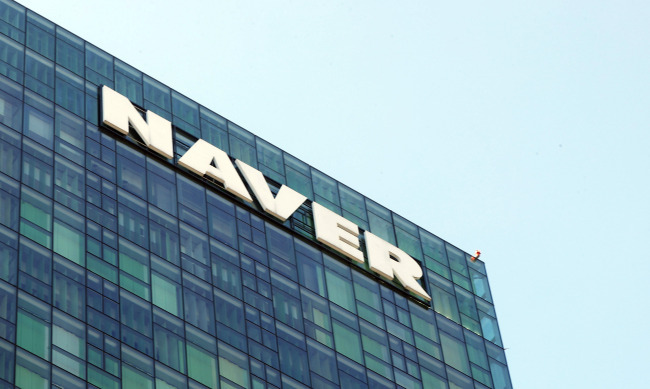[Newsmaker] Korea’s FTC head faces flak for calling Naver founder ‘visionless’
By Sohn Ji-youngPublished : Sept. 11, 2017 - 15:49
Fair Trade Commission Chairman Kim Sang-jo criticized the Naver founder, who he had recently met over the Korean internet giant’s listing on a new corporate watch list, in a recent interview with local newspaper Kookmin Ilbo.
“A company of Naver’s stature needs to harbor a vision for the future,” Kim said. “However, Lee was unable to present such a vision to our society, unlike Apple’s Steve Jobs.”
“Though I conversed only briefly with Lee, I felt he had shortcomings in those aspects. If Naver continues to proceed as it does now, it will continue to face many complaints,” he continued.
On the other hand, Kim had previously lauded President Moon Jae-in as a leadership figure resembling Steve Jobs in another interview with a local media outlet.

The remarks by Kim, a longtime activist for shareholders’ rights, has ignited criticism from Korea’s IT industry pioneers, including Lee Jae-woong, who founded Korea’s second-largest portal website Daum Communications, and Ahn Cheol-soo, the founder of Korea’s largest antivirus software company AhnLab and chairman of the People’s Party.
The Daum founder said in a public Facebook post Sunday that the FTC chief was “insolent” in characterizing the Naver founder who had “singlehandedly built Korea and Japan’s biggest IT companies without any government help” in such a way.
Following media attention, Lee Jae-woong changed his wording to describe Kim’s remarks as “inappropriate,” explaining that he had viewed Kim’s remarks as unbefitting for a minister-level government figure.
Ahn, an IT entrepreneur-turned-politician, joined in criticism of the FTC chairman during a National Assembly meeting Monday, stating that “Kim derided the Naver founder while flattering President Moon Jae-in as being similar to Steve Jobs.”
Ahn further lashed out at the government for continuing its long-held practice of “looking down on corporations.” He said that Korea is no longer in an age where businesses are under the leadership of the state, asking the government to form a foundation that encourages free and fair competition among businesses.
In response to the comments, the FTC chairman officially apologized for his remarks involving the Naver founder on Monday, stating that he “humbly accepts the criticisms with a heavy heart.”
“I will be more cautious in what I say as a public official and concentrate on my main duty to foster fair competition in the market and to protect the rights of small, marginalized businesses,” Kim said during a meeting with local business leaders at the FTC headquarters in Sejong City.
The controversy came as the FTC and Naver have been at odds over the company’s status change into a large corporation with an owner who exercises sizeable influence over the company.

The Naver founder had asked the state-run antitrust regulator to designate Naver as “ownerless,” on grounds that the concept of an owner is relevant only to family-controlled conglomerates long scrutinized for their dubious shareholding structures and corporate practices, rather than conventionally structured firms like Naver.
Lee had rejected the FTC’s view that he is Naver’s owner, citing his small stake in the company -- 4 percent -- and limited influence within the company as well as its transparent management system based on an elected CEO and board.
However, the FTC went ahead earlier this month to recognize Naver as a large corporation with founder Lee as its effective chief. Naver has mentioned plans to review legal action to challenge the FTC’s interpretation.
“To advance, Korea needs to formally recognize more ‘ownerless’ private companies and foster a corporate environment where such firms can grow in number,” Naver said in a statement.
By Sohn Ji-young (jys@heraldcorp.com)












![[Today’s K-pop] BTS pop-up event to come to Seoul](http://res.heraldm.com/phpwas/restmb_idxmake.php?idx=644&simg=/content/image/2024/04/17/20240417050734_0.jpg&u=)




![[KH Explains] Hyundai's full hybrid edge to pay off amid slow transition to pure EVs](http://res.heraldm.com/phpwas/restmb_idxmake.php?idx=652&simg=/content/image/2024/04/18/20240418050645_0.jpg&u=20240418181020)

![[Today’s K-pop] Zico drops snippet of collaboration with Jennie](http://res.heraldm.com/phpwas/restmb_idxmake.php?idx=642&simg=/content/image/2024/04/18/20240418050702_0.jpg&u=)